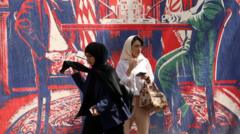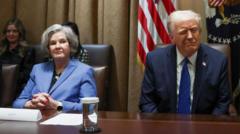A confidential report from the International Atomic Energy Agency reveals that Iran has increased its stockpile of near-bomb-grade uranium, now having the capability to fuel roughly 10 nuclear weapons. This development comes as Tehran continues its negotiations with the Trump administration, casting uncertainty on the potential for a diplomatic resolution.
Iran's Uranium Enrichment Escalates Amid Nuclear Negotiations

Iran's Uranium Enrichment Escalates Amid Nuclear Negotiations
Tehran's increased uranium production raises concerns, complicating talks with the Trump administration.
Iran has reportedly doubled its near-bomb-grade uranium stockpile in the past three months, raising alarms within the international community as the nation negotiates with officials from the Trump administration. This new information was shared through a confidential United Nations report distributed to world capitals by the International Atomic Energy Agency (IAEA). The report indicates that Iran can now produce enough bomb-grade fuel for about 10 nuclear weapons, an increase from five or six weapons stockpiled when President Trump took office.
The escalation poses a significant challenge for Washington's ongoing negotiations, where the administration has insisted on a complete cessation of Iran's nuclear material production. While President Trump expressed optimism about reaching an agreement soon, the reality of increased uranium production undermines those prospects.
IAEA Director-General Rafael M. Grossi emphasized the need for a diplomatic solution with a robust inspection system in place. Although Iran has previously limited access to its key nuclear sites by disabling surveillance equipment, the country has permitted inspectors to measure stockpiles of enriched uranium. Grossi’s quarterly assessment described the increase in highly enriched uranium as a serious concern, particularly given that Iran is the only non-nuclear weapon state producing such material.
As negotiations led by Trump envoy Steve Witkoff continue, the stakes have been raised, highlighting the need for a more rigorous approach to ensure that Iran does not advance its nuclear capabilities during talks. The international community watches closely, anxious to see how these developments will impact regional stability and diplomatic relations.
The escalation poses a significant challenge for Washington's ongoing negotiations, where the administration has insisted on a complete cessation of Iran's nuclear material production. While President Trump expressed optimism about reaching an agreement soon, the reality of increased uranium production undermines those prospects.
IAEA Director-General Rafael M. Grossi emphasized the need for a diplomatic solution with a robust inspection system in place. Although Iran has previously limited access to its key nuclear sites by disabling surveillance equipment, the country has permitted inspectors to measure stockpiles of enriched uranium. Grossi’s quarterly assessment described the increase in highly enriched uranium as a serious concern, particularly given that Iran is the only non-nuclear weapon state producing such material.
As negotiations led by Trump envoy Steve Witkoff continue, the stakes have been raised, highlighting the need for a more rigorous approach to ensure that Iran does not advance its nuclear capabilities during talks. The international community watches closely, anxious to see how these developments will impact regional stability and diplomatic relations.




















